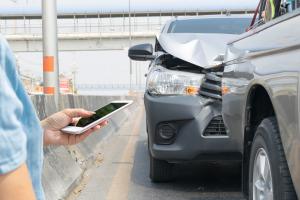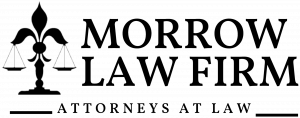— William P. Morrow
OPELOUSAS, LA, UNITED STATES, October 25, 2024 /EINPresswire.com/ — William P. Morrow, a lawyer at Morrow Law Firm, explains the complexities of vicarious liability in Louisiana car accident cases. Vicarious liability is a legal principle that holds individuals or entities responsible for the actions of another person under certain conditions, often arising in employer-employee relationships and vehicle ownership situations.
Understanding how this concept applies to car accidents is crucial for both accident victims and those potentially held liable.
“Vicarious liability allows for a third party to be held legally responsible for another individual’s actions, even if they were not directly involved in the incident,” says William P. Morrow. “In the context of car accidents, this means that employers, vehicle owners, or even parents may be liable for damages caused by someone else’s negligence.”
How Vicarious Liability Works in Louisiana
Vicarious liability applies when one party is held accountable for the actions of another based on their relationship. According to Morrow, this legal doctrine is particularly relevant in two key areas: employer-employee relationships and vehicle ownership.
In employer-employee situations, vicarious liability can hold employers accountable for accidents caused by employees who were performing job-related duties. Morrow explains that the concept of respondeat superior, meaning “let the superior answer,” underpins this form of liability. This principle is widely applied when an employee causes an accident while on the job, such as making deliveries or traveling between job sites.
“Employers can be held liable if the employee was acting within the scope of their employment at the time of the accident,” Morrow states. “This means that even if the employer was not directly involved, the relationship between the employer and employee is enough to establish liability.”
Employer-Employee Liability
Vicarious liability for employers arises when an employee causes an accident while carrying out work-related tasks. Morrow emphasizes that for liability to be established, the employee must have been acting within the scope of employment. This generally includes activities like driving a company vehicle or completing tasks that are part of their job duties.
“An employer will not be held liable if the employee was engaged in personal errands or activities outside of their work responsibilities at the time of the accident,” Morrow notes. “However, as long as the employee was performing job-related duties, the employer may be legally responsible for any resulting damages.”
Employers are urged to be mindful of their employees’ actions, particularly those involving company vehicles or tasks that require driving. According to Morrow, employers should ensure that employees are properly trained and licensed, as negligence on the part of the employee can lead to significant liability for the business.
Vehicle Ownership and Permissive Use Liability
In addition to employer-employee relationships, vicarious liability also extends to vehicle owners who allow others to drive their vehicles. Known as permissive use liability, this form of liability holds vehicle owners accountable when someone they have given permission to drive their car causes an accident.
“Permissive use liability arises when the vehicle owner consents to another person using their car,” Morrow explains. “If that individual causes an accident, the vehicle owner may be held liable for the damages, regardless of whether they were in the vehicle at the time.”
This liability typically applies if the owner gives express or implied permission for the driver to use the vehicle. If the driver causes an accident while using the vehicle with permission, the owner may be held responsible for damages, including property damage and bodily injury claims.
Morrow highlights that if the driver was using the vehicle without the owner’s consent, liability may not apply. However, proving whether permission was granted can sometimes be a challenging legal issue, especially when the driver is a family member or close acquaintance of the vehicle owner.
Parental Liability for Minor Drivers
Parents of minor drivers may also be held liable for car accidents caused by their children under Louisiana law. Morrow explains that if a minor is involved in an accident while driving a vehicle owned by a parent, the parent may be held responsible for damages.
“Parents have a duty to supervise and control their minor children’s actions, especially when it comes to driving,” says Morrow. “If a parent allows their child to drive without proper supervision or awareness of the child’s driving behavior, they may be held liable for any accidents the minor causes.”
Parental liability is more likely to apply if the parent is aware of the child’s dangerous driving habits or if the parent negligently entrusted the child with the vehicle. Morrow emphasizes that parents should be cautious when allowing their children to drive, particularly if the child is inexperienced or has a history of unsafe driving.
Exceptions to Vicarious Liability
While vicarious liability can apply in many cases, Morrow notes that there are exceptions where it may not hold. For example, employers may not be liable if an employee causes an accident while engaged in personal activities outside the scope of their job duties. Similarly, vehicle owners may avoid liability if they can prove that the driver was using the vehicle without permission.
“Each case must be evaluated based on the specific facts and circumstances,” Morrow explains. “Vicarious liability depends on the relationship between the parties involved and whether the negligent act was related to that relationship.”
Legal Considerations for Vicarious Liability Claims
Understanding vicarious liability is essential for individuals involved in car accidents, as it can expand the scope of parties who may be held liable for damages. Morrow advises accident victims to consider all potential sources of compensation, including employers, vehicle owners, and parents, when pursuing a claim.
“Vicarious liability can provide additional avenues for recovering compensation, especially in cases where the individual directly responsible for the accident lacks sufficient insurance coverage or assets,” Morrow notes.
For those who may be held liable under the principle of vicarious liability, it is important to understand the risks and take preventive measures. Employers should ensure that their employees are properly trained, and vehicle owners should be cautious when allowing others to drive their cars.
Conclusion
Vicarious liability plays a significant role in Louisiana car accident cases, particularly in employer-employee relationships and situations involving vehicle ownership. William P. Morrow, a lawyer at Morrow Law Firm, emphasizes the importance of understanding this legal doctrine and its implications for accident victims and those who may be held liable.
Morgan Thomas
Rhino Digital, LLC
+1 504-875-5036
email us here
Visit us on social media:
Facebook
Legal Disclaimer:
EIN Presswire provides this news content “as is” without warranty of any kind. We do not accept any responsibility or liability
for the accuracy, content, images, videos, licenses, completeness, legality, or reliability of the information contained in this
article. If you have any complaints or copyright issues related to this article, kindly contact the author above.
![]()
Originally published at https://www.einpresswire.com/article/754923632/understanding-vicarious-liability-in-louisiana-car-accidents





